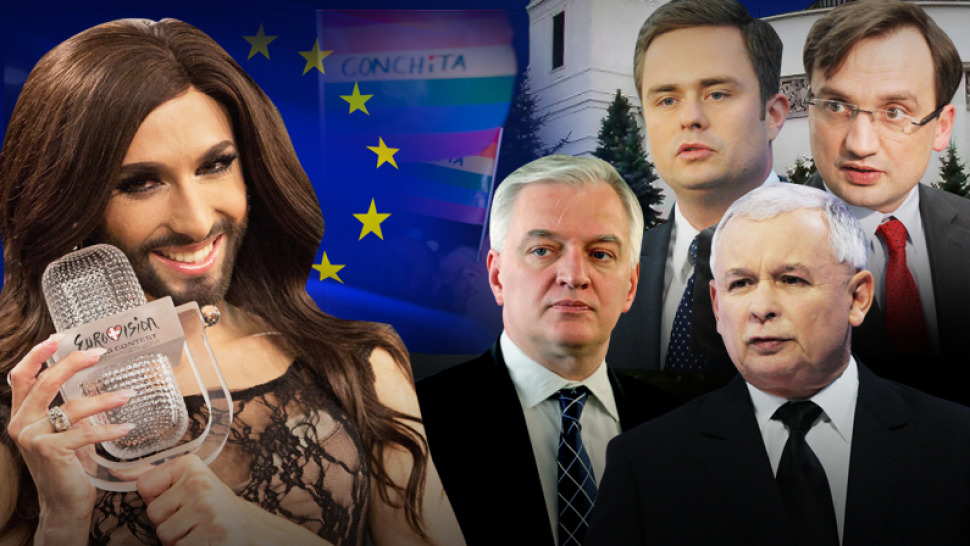Polish politicians from all major parties have suddenly become commentators on Conchita Wurst’s winning of the 2014 Eurovision Song Contest on May 10. This is a striking preoccupation given the upcoming European Parliamentary elections soon set to happen on May 22-25. While foreign policy situations like Ukraine and industrial concerns like the Polish coal industry were already key issues of the Polish campaign, Conchita seems to have turned attention in Poland once again to discourses on national identity, morality and gender & sexuality-related topics.

Unsurprisingly, the strongest opinions have come from the Polish right-wing parties. Adam Hoffman, spokesperson of the main opposition party Prawo i Sprawiedliwość (PiS), provocatively linked European moral degeneration, characterised by Conchita, with Polish Prime Minister Donald Tusk’s ‘approval for civil partnerships [and] his attitude towards social mores’. ‘This’, Hoffman asserted, ‘is the direction which results in a man in a dress or a bearded woman … winning Eurovision!’* Zbigniew Ziobro, leader of the far right-wing Solidarna Polska, advocated a return to traditional moral certainties: ‘It is important to stop such phenomena so that in Poland normality remains normality and a freak remains a freak.’ T.J. Tallie notes that Conchita has provoked similar political reactions in other Central and Eastern European countries such as Belarus and Russia but also in Armenia.
Conversely, representatives of the Polish left-wing parties used references to Conchita in order to associate themselves with a ‘progressive’ (i.e. Western) Europe. Marek Siwiec, a candidate from the Europa Plus coalition, asserts that ‘We are where Conchita is, while they [right-wing parties] are still in the nineteenth century’. The ruling party, center-right Platforma Obywatelska (PO), desirous to alienate neither right-wing nor left-wing voters, is least voluble about the topic, simply admitting that Conchita’s success is, in the words of Ireneusz Raś, ‘indeed controversial’.
Comments that frame any kind of gender or sexual non-conformity as Western, that is, alien to the Polish national identity, are nothing new. In his book ‘Gejerel’ on sexual minorities in the People’s Republic of Poland (PRP, 1952-1989), Krzysztof Tomasik shows that homosexuality appeared in popular culture of the Communist period as a foreign novelty, imported disease or the bored Western bourgeoisie’s decadent hobby. Later, in the democratic Poland, gender and sexuality-related issues regularly re-enter major public debates, particularly at times when Polish identity requires redefinitions vis-à-vis Europe. This was most clear in the early 1990s, immediately after the fall of Communism, when discussions about the shape of the new Poland included heated debates on abortion and the definition of marriage in the new Polish Constitution.
The issue of a ‘true’ Polish gender and sexual self returned in 2003, during the referendum on Poland’s accession to the European Union (EU). As Aleks Szczerbiak wrote, the Eurosceptic lobby in Poland, led by far-right Liga Polskich Rodzin (League of Polish Families), argued that ‘EU accession would lead to [among many other “tragedies”] the liberalisation of the abortion law and legalisation of euthanasia and gay marriage’. A more recent example of this rhetoric is the crusade by the Polish Roman-Catholic Church and some right-wing politicians against supposedly foreign ‘gender ideology’.
We should recognize that this Polish rhetoric is part of a larger phenomenon that Jasbir Puar names homonationalism, ‘a historical shift marked by the entrance of (some) homosexual bodies as worthy of protection by [some] nation-states’. Western-European countries frame themselves as essentially LGBT-friendly, and they frame Eastern-European countries as essentially homophobic, suggesting that the latter should catch up with the former. And as Catherine Baker points out, Eurovision too, as a symbol of (Western?) European identity, has been recently more often and more explicitly framed as the celebration of (Western?) ‘LGBT equality’.
In this discourse, Central and Eastern European countries are permitted only to reject or accept what is deemed to be the Western project of a tolerant and LGBT-friendly Europe, but never participate in making of it. The Polish right-wing and left-wing alike are complicit in this discourse. Commentators across the political spectrum all seem to agree that a tolerant and LGBT-friendly Europe is a Western and not a Polish project. While the right-wing despises the project, the left-wing aspires to it. As one liberal commentator on Conchita’s success puts it:
We are ashamed of the economic gulf between us and Western Europe … But at least, in this regard, we’re catching up with the West. The economists say that in two decades the quality of life in Poland and Germany will be comparable. Unfortunately, mentally we have been stuck in the same place for decades.
Robert Kulpa and Joanna Mizielińska name this rhetoric the ‘western progress narrative’ and argue that it frames Central and Eastern Europe (CEE) as always, by definition, in transition and behind the West: ‘In a sense the West is always already “post” … whatever CEE became/is/will be, the West had become/has already been/will have been.’ I suggest that what we most need is to challenge this rhetoric. Only then can we finally stop catching up with ‘progressive Western Europe’ and instead actively participate in making the Europe we want.
During Eurovision, Poland gave no points to Austria because the official Polish jury ranked the song so low. However, many viewers had an entirely different opinion and Conchita was ranked 4th in the Polish popular vote. Catherine Baker and Roch Dunin-Wąsowicz point out similar disproportions between jury and popular voting results in other CEE countries as well. Rather than being expected to ‘mentally’ catch up with their Western neighbours, the people of Poland and CEE should be taken more seriously as active participants in the making of a more diverse and open Europe, Conchita’s Europe.
* All quotes come from the tvn24.pl material available here.
 Łukasz Szulc is a PhD Candidate in the Department of Communication Studies at the University of Antwerp. His research project investigates (trans)national queers online and is based on case studies from both Poland and Turkey. Łukasz blogs in Polish at www.dopiskipedala.blox.pl and his personal website is www.lukaszszulc.com He tweets from @lukaszszulc
Łukasz Szulc is a PhD Candidate in the Department of Communication Studies at the University of Antwerp. His research project investigates (trans)national queers online and is based on case studies from both Poland and Turkey. Łukasz blogs in Polish at www.dopiskipedala.blox.pl and his personal website is www.lukaszszulc.com He tweets from @lukaszszulc

NOTCHES: (re)marks on the history of sexuality is licensed under a Creative Commons Attribution-NonCommercial-NoDerivatives 4.0 International License.
Based on a work at www.notchesblog.com.
For permission to publish any NOTCHES post in whole or in part please contact the editors at NotchesBlog@gmail.com





Pingback: Hirsute Phoenix: Conchita Wurst, Beards, and the Politics of Sexuality | Notches: (re)marks on the history of sexuality